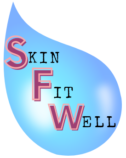Ever notice your skin looks worse in the summer? According to a few studies, your skin can get worse depending on the season due to a few factors described below.
Table of Contents
Acne
Acne is an inflammatory skin condition primarily caused by a mix of sebum and bacteria. Once oil and bacteria clog the hair follicle of the skin, it produces an inflammatory reaction that results in a lesion.
Factors like puberty, hormonal changes, diet, lifestyle, and topical application of skincare products all affect how the skin produces and regulates sebum. External factors associated with warm weather may also have an affect on the skin and inflammatory lesions.
Temperature and Humidity
The temperature in the summer is typically hot and that “sticky” feeling you feel is due to the excess moisture in the air – humidity. Due to these factors, patients may see an uptick in acne as these are factors that can exacerbate acne.
One study found that people reported an increase in the aggravation of acne due to hot temperatures (1). The heat not only causes you to sweat, but also encourages inflammation, redness, and puts stress on the body when it is particularly hot.
Sun
It’s lovely to be out on a hot day with the sun beating down on your skin. Unfortunately, the sun’s harmful UV rays can wreak havoc on the skin. UVA rays are primarily responsible for photoaging. In other words, these UV rays contribute to the loss of collagen and elasticity of the skin. The rays can make dark spots more visible as it darkens pigmentation and damages skin cells. This gives the appearance of darker, more dull skin.
In addition, soaking up the rays may cause you to get a sunburn without adequate protection from sunscreen. Sunburns result in dry, flaky, red, and irritated skin. This makes the skin appear dull and unhealthy. The itching that results can cause acne lesions to erupt and the skin becomes inflamed.
Sweat
Sweat is a naturally occurring bodily function that helps keep the body cool when heated. While this is an essential function, it is good to note that this may also be contributing to your breakouts, especially if the sweat is not washed off properly.
When sweat is left on the surface of your skin, while most of the water content will evaporate, the rest of the substances in your sweat will create an occlusion on the surface of your skin. Due to this, sweat will cause the hair follicles in the skin to trap oil and dead skin cells, causing an inflammatory reaction and acne lesions.
In addition, sweat on the skin often leads you to wipe away that sweat with a towel or other type of fabric. Ultimately this causes bacteria such as Cutibacterium acnes (a common bacteria that contributes to acne formation) to spread easily to multiple areas of the skin. In this way, pores become clogged as this bacteria proliferates, and causes acne.
Bacteria
Pityrosporum folliculitis, otherwise known as Malasezzia folliculitis, is a type of condition caused by a yeast that lives on the surface of your skin. In some patients, the hair follicles in the skin become clogged, leading to inflamed lesions. This is called fungal acne (2).
Fungal acne is characterized by itchy skin, coupled with small, recurrent lesions, and sometimes red or inflamed skin. One study showed that the Malasezzia yeast thrived more readily in the summer than in colder temperatures. The yeast was able to proliferate in heated conditions (3). This may be a reason as to why acne flares in the summer months, where the heat and humidity creates an ideal environment for yeast and subsequently acne lesions.
How To Treat Summer Acne

1. Loose clothing
Wearing loose clothing and moisture wicking fabrics such as cotton can help prevent sweat from becoming trapped on the skin. As stated previously, trapped sweat clogs hair follicles. The more sweat is able to evaporate off the skin, the less chance of occlusion and clogged pores.
2. Washing your face twice per day
Sweat must be washed off at the end of the day, and the skin should be cleansed once in the morning as well. Cleansing the skin not only ensures that sweat is not left on the surface of the skin for long periods of time, but it also gets rid of excess sebum and dead skin cells to prevent clogged pores.
3. Don’t skip out on moisturizing
As much as you may feel sticky in the humidity, never skip out on moisturizing the skin, especially after cleansing. The sun’s rays can dry the skin, making the skin dry and parched for moisture. Keep your skin barrier healthy and functioning by adequately applying moisturizing at least twice per day.
4. Treatments
Topical acne treatments during the summer are imperative to keep your skin acne free. Over the counter solutions like benzoyl peroxide or salicylic acid can be safely used to reduce acne and inflammation on the skin.
5. Sunscreen
Most importantly, using sunscreen to protect your skin from the harmful rays of the sun will help to prevent darkening of pigmentation, reduce inflammation of the skin, prevent sunburns, and significantly reduce the effects of photoaging.

